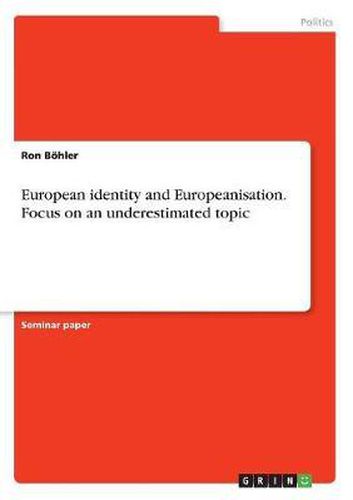Readings Newsletter
Become a Readings Member to make your shopping experience even easier.
Sign in or sign up for free!
You’re not far away from qualifying for FREE standard shipping within Australia
You’ve qualified for FREE standard shipping within Australia
The cart is loading…






Seminar paper from the year 2010 in the subject Politics - International Politics - Topic: European Union, grade: 1.7, University of Bath, language: English, abstract: This study examines the concept of a general European identity. First, the underlying concept of ‘identity’ in the European socio-political context will be defined and elaborated in its different levels and peculiarities. Second, the study addresses the various theories of Europeanisation as they mirror the current state of the scientific debate. The essay concludes by extracting the additive of the concept of ‘identity’ for Europeanisation theories. The European Union (EU) faces a dilemma: While life and politics of the European citizens become more and more Europeanised, the emergence of a European identity seems to fail. People all over Europe cannot identify with the idea of European unification as a whole, although this might spread peace, freedom and welfare. On the other hand, if the EU or its citizens themselves would be able to create European ‘imagined community’, by whatever means, the split between both concepts would be overcome. But how is the concept of ‘identity’ then connected to Europeanisation processes? The main argument here is that ‘identity’ still is an underestimated object of Europeanisation theories, but that the rise of hybrid identities, and with it the manifestation of Europeanised national identities instead of a European identity all over Europe, holds the explicit potency to establish the missing relationship between European citizens and EU politics. This would lead suddenly to a strengthened legitimization of European Union policies as well as peoples belief in the justification of a supranational polity within a system of multi-level governance.
$9.00 standard shipping within Australia
FREE standard shipping within Australia for orders over $100.00
Express & International shipping calculated at checkout
Seminar paper from the year 2010 in the subject Politics - International Politics - Topic: European Union, grade: 1.7, University of Bath, language: English, abstract: This study examines the concept of a general European identity. First, the underlying concept of ‘identity’ in the European socio-political context will be defined and elaborated in its different levels and peculiarities. Second, the study addresses the various theories of Europeanisation as they mirror the current state of the scientific debate. The essay concludes by extracting the additive of the concept of ‘identity’ for Europeanisation theories. The European Union (EU) faces a dilemma: While life and politics of the European citizens become more and more Europeanised, the emergence of a European identity seems to fail. People all over Europe cannot identify with the idea of European unification as a whole, although this might spread peace, freedom and welfare. On the other hand, if the EU or its citizens themselves would be able to create European ‘imagined community’, by whatever means, the split between both concepts would be overcome. But how is the concept of ‘identity’ then connected to Europeanisation processes? The main argument here is that ‘identity’ still is an underestimated object of Europeanisation theories, but that the rise of hybrid identities, and with it the manifestation of Europeanised national identities instead of a European identity all over Europe, holds the explicit potency to establish the missing relationship between European citizens and EU politics. This would lead suddenly to a strengthened legitimization of European Union policies as well as peoples belief in the justification of a supranational polity within a system of multi-level governance.